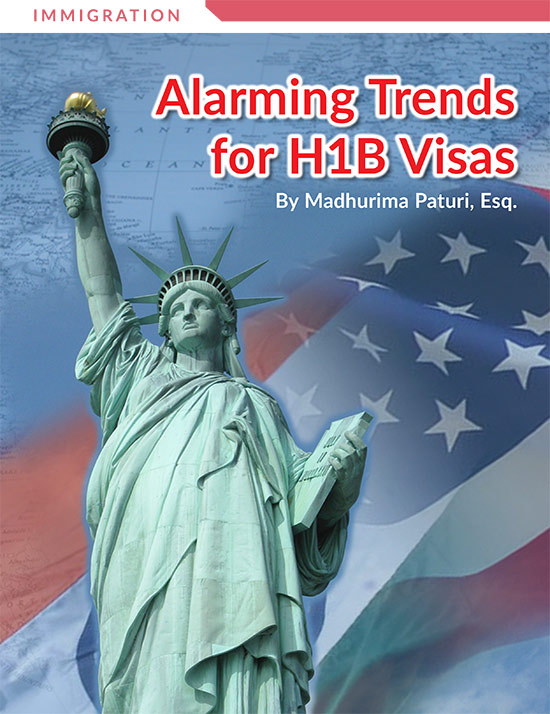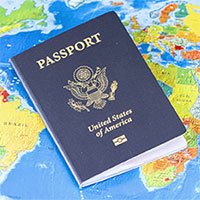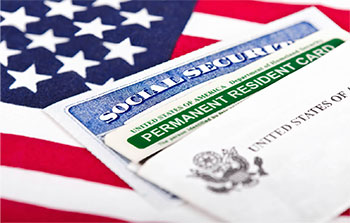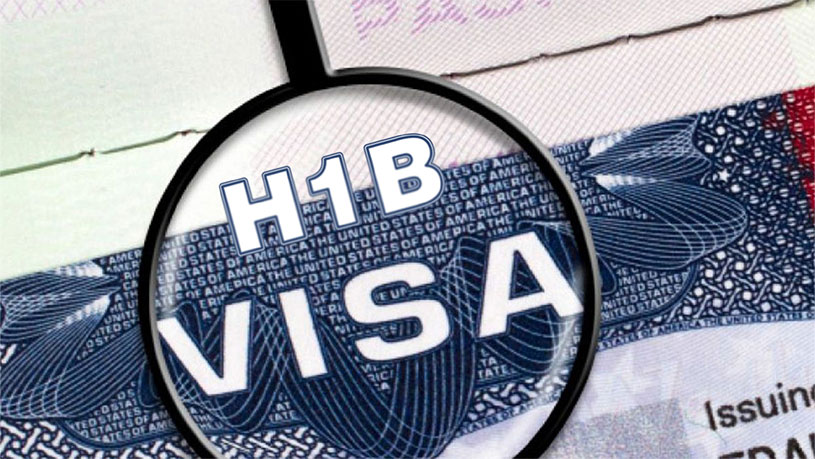Alarming Trends for H1B Visas
 |
With the recent administration change to the Trump presidency, USCIS has modified their regulations as it pertains to immigrants. In particular, H-1B visas have taken the spotlight as more scrutiny from USCIS is being focused on these visas. Now, more than ever, employers of H-1B candidates must be diligent in following the regulations, and be aware of new memoranda from USCIS that seemingly is published on a weekly basis. | |
|
Much talk has been focused on the USCIS policy memorandum clarifying existing regulatory requirements relating to existing H-1B petitions for those employees working at third party locations. Effective as of February 22, 2018, the policy states that in order for H-1B petitions that involve a third party worksite to be approved, petitioners must show by a preponderance of evidence that:
According to the Policy Memorandum, USCIS will be scrutinizing that Petitioners must demonstrate that they have specific, non speculative (i.e., a readily ascertainable project) in a specialty occupation for the Beneficiary for the entire time requested on the petition. What this means is that even though the Petitioner usually requests the maximum three years on the application, if the project shows that it will be completed in 1 year, then the H-1B will only be granted for this 1 year timeframe. In addition, and at a minimum, employers must provide contracts, work orders and work itineraries for employees who work at third party locations. However, employers must be aware that simply providing these documents is not enough. Itineraries MUST include the dates and locations of the services to be provided. If services are to be performed in more than one location, an itinerary for each location showing the dates of work performed and what services will be provided at each location must be included. Of utmost importance for employers is the fact that USCIS may now deny the petition at the initial stage if the itinerary is not provided. In other words, an employer may not receive a Request for Evidence from USCIS that would allow a petitioner to submit an itinerary at a later time; the petition may be denied immediately.
Finally, it is also important to note that the Policy Memorandum also applies to H-1B extensions. Petitioners must show that H-1B requirements have all been met during the course of past employment with the same petitioner; otherwise the extension may be denied. While the Policy Memorandum has garnered all of the attention, an employer must also be aware of other enforcement actions USCIS is doing behind the scenes on H-1B visas. For example, USCIS has always had the ability to perform site visits of an employer’s business to verify information contained in the H-1B petition, but now, in a potentially alarming trend, USCIS is going even further to verify an employer’s information: They are demanding beneficiaries of H-1B petitions show up at a USCIS office, often with only one to two days notice. Once the beneficiary arrives for the “interview”, the hearing officer proceeds to grill the employee for a harrowing 1-2 hours to ascertain any and all information about the employer’s workplace and the project the beneficiary is working on.
Furthermore, USCIS now has a technical specialist on staff, and this person acts as an additional interviewer by asking the employee software and/or hardware questions about the project. This additional interviewer is a new concept, and shows the great length USCIS will go to ensure all information contained in the petition, and by extension, a Beneficiary’s resume, is accurate. Employers are reminded that they must remain vigilant, and provide all information on the I-129 petition and LCA accurately at the time of filing, as they are attesting that the information contained is correct. Falsifying information can lead to civil or criminal action, and in the case of at least 15 companies, a debarment from applying for H-1B visas for a time period of 1-2 years. In addition, employees with criminal records need to be especially wary, as USCIS may arrest the employee at the time of the interview. It is important to note that while employers should remain cautious, there is no need to panic. Employers should have a complete, accurate file of all petitions and the backup documentation to support their petitions at all times. |
||
|
||



 USCIS has also made it clear that detailed statement of work or work orders signed by an authorized official of the end client, that details the specific duties the Beneficiary will perform, duration of the job, and the hours to be worked, along with the specific project a Beneficiary will be working on should be delineated on any paperwork submitted. Additionally, additional evidence should, as a best practice, be included with the initial petition. This evidence can include technical documentation of a project, marketing or cost benefit analysis, or brochures.
USCIS has also made it clear that detailed statement of work or work orders signed by an authorized official of the end client, that details the specific duties the Beneficiary will perform, duration of the job, and the hours to be worked, along with the specific project a Beneficiary will be working on should be delineated on any paperwork submitted. Additionally, additional evidence should, as a best practice, be included with the initial petition. This evidence can include technical documentation of a project, marketing or cost benefit analysis, or brochures. The types of information a hearing officer can ask the beneficiary runs the gamut from where is the office located; to who a beneficiary’s co-workers are; to where does the employee live while employed in the position. From there, questions can delve into whether the employer has enough specialty occupation work available for all beneficiaries; the specific project the employee is working on; or how many employees work in the office at any given time. USCIS may also ask who brought the end client in to the employer. USCIS wants to establish the employer/employee relationship, and show that the employer is the one who is in control of the relationship.
The types of information a hearing officer can ask the beneficiary runs the gamut from where is the office located; to who a beneficiary’s co-workers are; to where does the employee live while employed in the position. From there, questions can delve into whether the employer has enough specialty occupation work available for all beneficiaries; the specific project the employee is working on; or how many employees work in the office at any given time. USCIS may also ask who brought the end client in to the employer. USCIS wants to establish the employer/employee relationship, and show that the employer is the one who is in control of the relationship. About the Author
About the Author



























